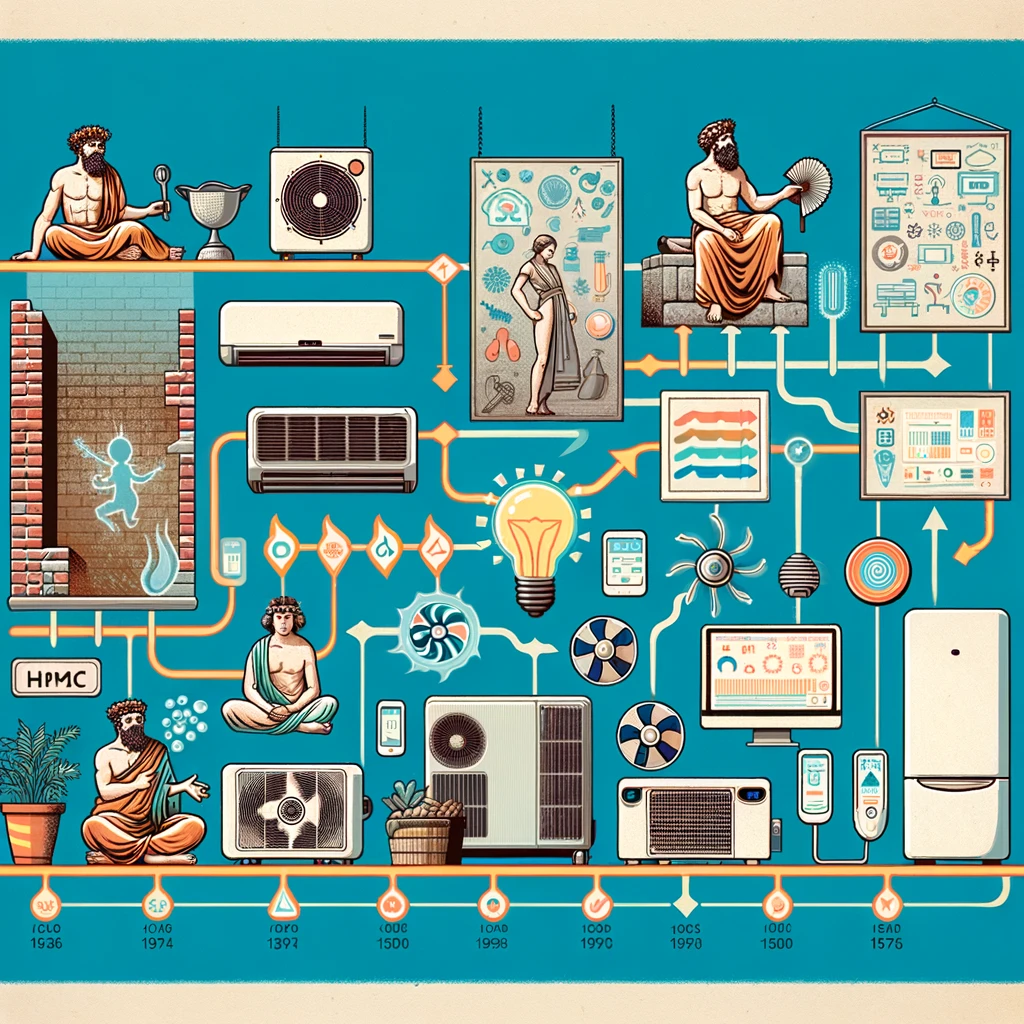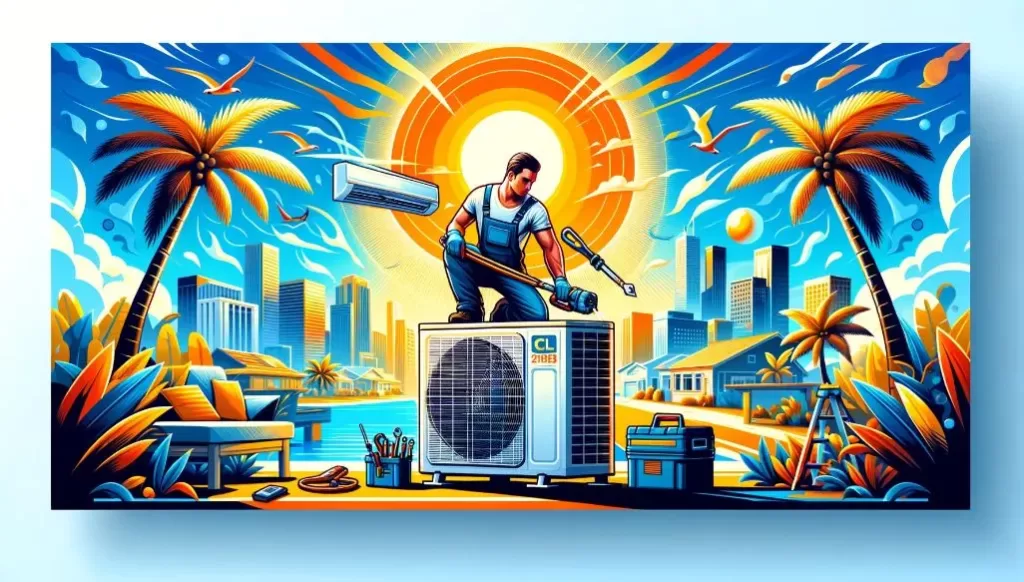From Florida
Florida’s relentless sunshine often demands a cooling embrace, Florida is very hot and sunny most of the year. This means people often need ways to cool down inside buildings and homes. The development of air conditioners and other heating, ventilation and air conditioning (HVAC) systems has helped make living in Florida more comfortable. We will look at how cooling technology has improved over time in the state. We will also discuss what the newest air conditioning and HVAC systems are like today in Florida. The goal is to understand how people have handled the heat over the years and where the technology is now.
The Evolution of HVAC: A Journey Through Time

In the not-so-distant past, air conditioning was a luxury, and the systems of yesteryears pale in comparison to the sophistication of today’s HVAC technology. As explained by Kyzar Air Conditioning, the evolution has been profound; early innovations marked the first step towards climate control, and the advent of mechanical cooling systems revolutionized the way we experience indoor comfort. Refrigerants, introduced in the mid-20th century, transformed the efficiency and reliability of HVAC systems. Digital era advancements, such as the integration of digital thermostats and smart controls, ushered in a new era of precision and energy efficiency. Each technological stride becomes a testament to human determination to conquer environmental challenges. From the humble beginnings of mechanical systems to the intricacies of modern digital controls, the evolution of HVAC unfolds as a narrative of relentless pursuit – a story where innovation bridges the gap between the desire for comfort and the ability to command climate at will.
Historical Context in Florida
Florida’s climate, characterized by high temperatures and humidity, has long been a testing ground for cooling technologies. Historically, the demand for effective cooling solutions in the state has driven advancements in HVAC systems. The need to combat the relentless heat has steered the evolution of air conditioning, shaping technologies uniquely suited for Florida’s tropical environment.
In this dynamic environment, innovators and engineers have actively responded to the challenges posed by the Sunshine State’s climate, developing systems that not only cool but also efficiently manage humidity levels. The historical context unveils a narrative of perseverance, where each technological stride has been a response to the distinct demands of Florida’s heat. This evolution showcases not just the progression of HVAC systems but a continuous commitment to enhancing the quality of life for Floridians by providing reliable and effective my cooling store solutions.
The State of HVAC Technology in Florida
- HVAC is crucial in Florida due to the hot and humid climate, making it a high-demand profession with job security.
- Florida has specific licensing requirements for HVAC professionals, including a state-issued and certification.
- The U.S. Department of Labor projects a 15% growth rate for HVAC mechanics and installers in Florida.
- Energy-efficient technologies are being developed in Florida, such as optimized heat exchangers and advanced membrane-based rooftop air conditioners.
- The median salary for an HVAC technician in Florida is $46,850, with potential for increased earnings based on experience, training, and certifications.
- Florida has a high number of HVAC technicians, with many holding a certificate or associate’s degree in Refrigeration, Air Conditioning, Heating, and Gas Technology.
- Governor Ron DeSantis has rejected federal funds for energy rebates, which could have helped families with the cost of replacing HVAC systems.
- Recent data shows a slight decrease in birth rates in Florida in the first half of 2023.
Today’s HVAC systems have become integral to life in Florida, providing not just comfort but also health benefits. The cutting-edge technology in modern systems ensures energy efficiency, with smart HVAC systems optimizing consumption and contributing to environmental sustainability. Precision cooling through zoning technology allows for targeted cooling in specific areas, enhancing overall efficiency. Advanced filtration systems ensure the circulation of clean and healthy air, crucial in humid climates.
In the active pursuit of a more comfortable and healthier indoor environment, Floridians are embracing these advancements in HVAC technology. The present-day systems actively respond to the diverse needs of Florida’s residents, offering not only respite from the heat but also contributing to a sustainable and health-conscious lifestyle. As the state continues to evolve, so too does the technology that keeps its homes and businesses cool, providing a harmonious blend of innovation and environmental responsibility.
Technological Marvels: New Frontiers in HVAC
- Smart HVAC Systems:
- Advanced sensors and AI-driven control systems for optimized energy consumption and personalized comfort.
- Integration with IoT devices and home automation systems for seamless control and monitoring.
- HVAC and Health:
- Improved air filtration and purification technologies to reduce indoor air pollution and allergens.
- Focus on maintaining optimal humidity levels for occupant health and well-being.
- Sustainable HVAC Solutions:
- Adoption of eco-friendly refrigerants and materials to minimize environmental impact.
- Integration of renewable energy sources, such as solar power, to reduce carbon footprint.
- HVAC Efficiency Innovations:
- Development of energy-efficient heat pumps and air conditioning systems to reduce energy consumption.
- Use of advanced insulation materials and techniques to minimize heat loss and improve overall efficiency.
- HVAC Design and Aesthetics:
- Adoption of sleek, modern designs that blend seamlessly with interior spaces.
- Customization options to match individual preferences and architectural styles.
- Predictive Maintenance:
- Remote monitoring and diagnostics to identify potential issues before they become major problems.
- Proactive maintenance scheduling to ensure optimal performance and longevity of HVAC systems.
- HVAC and Climate Change:
- Development of HVAC technologies that can adapt to changing climate conditions and extreme weather events.
- Collaboration with climate scientists and urban planners to create climate-resilient buildings and cities.
As technology continues to advance, HVAC systems undergo continuous refinement. In the realm of air cooling, these advancements are particularly noteworthy. Smart thermostats, integrated with smart home systems, allow for remote control and automated temperature adjustments, providing users with unprecedented control over their indoor environment. Variable Refrigerant Flow (VRF) Systems offer precise control over cooling and heating in different zones, optimizing energy usage. Energy Recovery Ventilators (ERVs) enhance energy efficiency by transferring heat and humidity between incoming and outgoing air streams, contributing to a more sustainable and cost-effective operation of HVAC systems.
In this era of constant innovation, these technological marvels not only redefine the parameters of comfort but also pave the way for a more sustainable and efficient future. The active integration of these cutting-edge features represents a paradigm shift in how HVAC systems are perceived – not just as climate control devices but as dynamic contributors to energy conservation and environmental stewardship.
The Florida Advantage: Tailored HVAC Solutions for Tropical Climates
The unique climatic challenges of Florida have prompted the development of HVAC systems specifically designed for the region. These systems go beyond conventional cooling solutions. They incorporate humidity control features and are engineered to withstand extreme temperatures, ensuring optimal performance even in the face of the Sunshine State’s weather extremes. In the active pursuit of providing tailored solutions for Florida’s tropical climate, HVAC engineers and manufacturers continually refine and adapt their systems. The advantage lies not only in efficient cooling but in addressing the nuanced demands of high humidity. These tailored HVAC solutions actively respond to the specific environmental conditions, ensuring that residents of Florida experience not just cooling but a comprehensive climate control that enhances comfort and well-being in the unique tropical context. The synergy between technological innovation and environmental adaptation positions Florida at the forefront of HVAC excellence, providing a model for regions with similar climatic challenges.
Conclusion
In summary, the development of air conditioning and HVAC technology has been important for making life in hot and humid Florida more comfortable. From early basic cooling methods to modern, high-tech systems, we have come a long way. Today’s AC units and HVAC systems can keep homes and buildings in Florida cool efficiently. As technology continues to advance, air conditioning and related systems are likely to become even more effective, eco-friendly, and affordable. Air conditioning has enabled people to better enjoy living in the Florida climate. And future innovations in the field will ensure residents can continue to stay comfortable, while using less energy and resources. The progress we have made and will continue to make in HVAC technology shows how human ingenuity can positively impact people’s lives.

